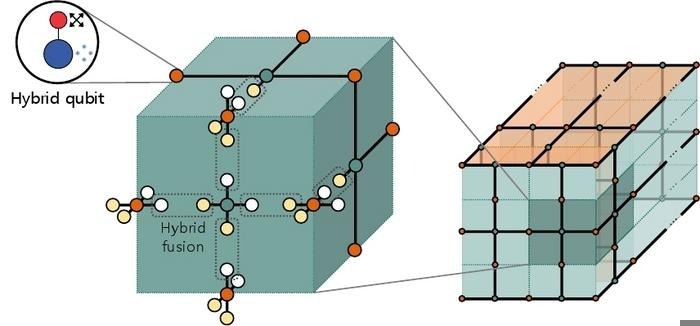Reviewed by Lexie CornerOct 17 2024
Researchers at the Korea Institute of Science and Technology (KIST) have proposed a method to integrate error correction for discrete variable (DV) and continuous variable (CV) qubits, which were previously developed separately. Their study was published in PRX Quantum.
 Fault-tolerant quantum computing architecture using hybrid qubits / Fault-tolerant quantum computing architecture based on hybrid qubits that utilize both DV and CV qubits simultaneously. It utilizes hybrid fusion techniques to connect hybrid qubits to form an error-correcting lattice structure. Image Credit: Korea Institute of Science and Technology
Fault-tolerant quantum computing architecture using hybrid qubits / Fault-tolerant quantum computing architecture based on hybrid qubits that utilize both DV and CV qubits simultaneously. It utilizes hybrid fusion techniques to connect hybrid qubits to form an error-correcting lattice structure. Image Credit: Korea Institute of Science and Technology
Developing quantum error correction technology is a major hurdle in realizing quantum computers. This technology is essential for addressing and preventing errors in qubits, the core components of quantum computation, from escalating during processing.
Without quantum error correction, quantum computers cannot outperform classical systems, making this a critical area of research worldwide.
Dr. Seung-Woo Lee's team at the KIST's Quantum Technology Research Centre has developed the world’s first hybrid quantum error correction method that integrates discrete variable (DV) and continuous variable (CV) qubits. The team also designed a fault-tolerant quantum computing architecture based on this hybrid method.
Logical qubits, which implement quantum error correction, can be designed in two primary ways: Continuous Variable (CV) and Discrete Variable (DV). Companies like Amazon (AWS) and Xanadu are developing quantum computers using the CV approach, while IBM, Google, Quera, and PsiQuantum focus on the DV method. Each method has its own strengths and limitations in terms of resource efficiency and ease of manipulation.
KIST researchers proposed a method to integrate error correction for both DV and CV qubits, which were previously developed separately. By creating a fault-tolerant architecture using this hybrid approach, the team demonstrated through numerical simulations that their method combines the advantages of both, improving the efficiency and effectiveness of quantum computation and error correction.
In optical quantum computing, this hybrid approach can handle photon loss with a threshold up to four times higher than current techniques and boosts resource efficiency by more than 13 times while maintaining the same logic error rate.
The hybrid quantum error correction technology developed in this study can be combined not only with optical systems but also with superconductors and ion trap systems.
Dr. Jaehak Lee, Korea Institute of Science and Technology
Dr. Seung-Woo Lee of KIST, who led the research, added, “This research provides a new direction for the development of quantum computing. Hybrid technologies that integrate the advantages of different platforms are expected to play a crucial role in developing and commercializing large-scale quantum computers.”
KIST and the University of Chicago signed a memorandum of understanding (MOU) in March last year to collaborate on quantum technology research, involving both institutions and Seoul National University. Just over a year into this international research partnership, the researchers announced a significant achievement, highlighting their potential to create core technologies that will advance the competitive field of quantum computing.
KIST is also hosting an international collaborative research center focused on developing core technologies for quantum error correction. This collaboration includes partners such as the University of Chicago, Seoul National University, and Canadian quantum computing company Xanadu.
Journal Reference:
Lee, J. et. al. (2024) Fault-Tolerant Quantum Computation by Hybrid Qubits with Bosonic Cat Code and Single Photons. PRX Quantum. doi.org/10.1103/PRXQuantum.5.030322